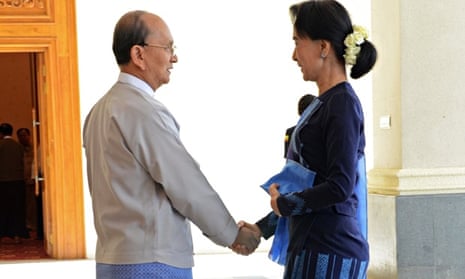Burma’s parliament will consider amending the country’s constitution – which currently bars the opposition leader, Aung San Suu Kyi, from becoming president – before crucial elections next year, an official said on Friday.
Suu Kyi is trying to change key sections of Burma’s charter ahead of 2015 polls that are widely expected to be won by her National League for Democracy (NLD), if they are free and fair, after decades of military rule.
The move to moot constitutional reform was discussed during unprecedented talks between President Thein Sein and his political rivals, including Suu Kyi, as well as top army brass and election officials. “They agreed to discuss the issue of amending the constitution in parliament, according to the law,” presidential spokesman Ye Htut told reporters after the meeting in the capital Naypyidaw.
The NLD has focused on altering a provision in the constitution that ensures the military in the former junta-ruled nation has a veto on any amendment to the charter. It believes that revising the clause will open the way for further changes to other constitutional provisions, including the ring-fenced proportion of soldiers in parliament and the effective bar on Suu Kyi leading the country. Ye Htut did not elaborate on which elements of the constitution were up for debate.
As it stands, Suu Kyi is ineligible to become president because of a clause in the 2008 charter blocking anyone whose spouse or children are overseas citizens from leading the country. The Nobel laureate’s late husband was British, as are her two sons. Altering the constitution requires support from a 75% majority in parliament, and as unelected soldiers make up a quarter of the legislature they have the last say on any changes.
On Friday, at the first talks of their kind as the nation emerges from decades of outright military rule, Thein Sein and Suu Kyi walked in to the meeting together. The discussions, which lasted for more than two hours, came a day after the White House said the US president, Barack Obama, spoke to Thein Sein and Suu Kyi about the elections, which are seen as a key test of democratic reforms under the quasi-civilian government.
A White House statement on Thursday said Obama “underscored the need for an inclusive and credible process for conducting the 2015 elections” during telephone talks with the Burmese president. The US leader also spoke to Suu Kyi about how Washington could “support efforts to promote tolerance, respect for diversity, and a more inclusive political environment”, it said.
Obama will visit Burma in a fortnight’s time for a major regional conference.
Burma authorities announced last week that the landmark polls would be held in the final week of October or the first week of November 2015.
